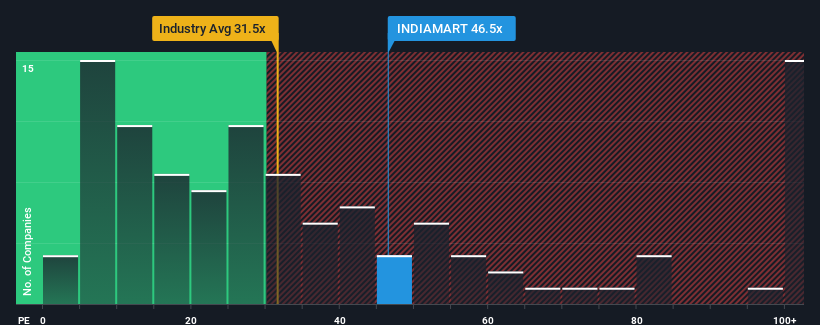- India
- /
- Trade Distributors
- /
- NSEI:INDIAMART
IndiaMART InterMESH Limited's (NSE:INDIAMART) Business Is Yet to Catch Up With Its Share Price
IndiaMART InterMESH Limited's (NSE:INDIAMART) price-to-earnings (or "P/E") ratio of 46.5x might make it look like a sell right now compared to the market in India, where around half of the companies have P/E ratios below 31x and even P/E's below 17x are quite common. Nonetheless, we'd need to dig a little deeper to determine if there is a rational basis for the elevated P/E.
Recent times have been advantageous for IndiaMART InterMESH as its earnings have been rising faster than most other companies. It seems that many are expecting the strong earnings performance to persist, which has raised the P/E. You'd really hope so, otherwise you're paying a pretty hefty price for no particular reason.
See our latest analysis for IndiaMART InterMESH

Does Growth Match The High P/E?
In order to justify its P/E ratio, IndiaMART InterMESH would need to produce impressive growth in excess of the market.
Retrospectively, the last year delivered an exceptional 32% gain to the company's bottom line. The latest three year period has also seen a 24% overall rise in EPS, aided extensively by its short-term performance. Therefore, it's fair to say the earnings growth recently has been respectable for the company.
Turning to the outlook, the next three years should generate growth of 17% per year as estimated by the twelve analysts watching the company. Meanwhile, the rest of the market is forecast to expand by 19% per annum, which is noticeably more attractive.
With this information, we find it concerning that IndiaMART InterMESH is trading at a P/E higher than the market. It seems most investors are hoping for a turnaround in the company's business prospects, but the analyst cohort is not so confident this will happen. There's a good chance these shareholders are setting themselves up for future disappointment if the P/E falls to levels more in line with the growth outlook.
The Bottom Line On IndiaMART InterMESH's P/E
Using the price-to-earnings ratio alone to determine if you should sell your stock isn't sensible, however it can be a practical guide to the company's future prospects.
Our examination of IndiaMART InterMESH's analyst forecasts revealed that its inferior earnings outlook isn't impacting its high P/E anywhere near as much as we would have predicted. When we see a weak earnings outlook with slower than market growth, we suspect the share price is at risk of declining, sending the high P/E lower. Unless these conditions improve markedly, it's very challenging to accept these prices as being reasonable.
Plus, you should also learn about these 2 warning signs we've spotted with IndiaMART InterMESH.
Of course, you might find a fantastic investment by looking at a few good candidates. So take a peek at this free list of companies with a strong growth track record, trading on a low P/E.
New: AI Stock Screener & Alerts
Our new AI Stock Screener scans the market every day to uncover opportunities.
• Dividend Powerhouses (3%+ Yield)
• Undervalued Small Caps with Insider Buying
• High growth Tech and AI Companies
Or build your own from over 50 metrics.
Have feedback on this article? Concerned about the content? Get in touch with us directly. Alternatively, email editorial-team (at) simplywallst.com.
This article by Simply Wall St is general in nature. We provide commentary based on historical data and analyst forecasts only using an unbiased methodology and our articles are not intended to be financial advice. It does not constitute a recommendation to buy or sell any stock, and does not take account of your objectives, or your financial situation. We aim to bring you long-term focused analysis driven by fundamental data. Note that our analysis may not factor in the latest price-sensitive company announcements or qualitative material. Simply Wall St has no position in any stocks mentioned.
About NSEI:INDIAMART
IndiaMART InterMESH
Operates an online business-to-business marketplace for business products and services in India and internationally.
Flawless balance sheet with solid track record.
Similar Companies
Market Insights
Community Narratives




